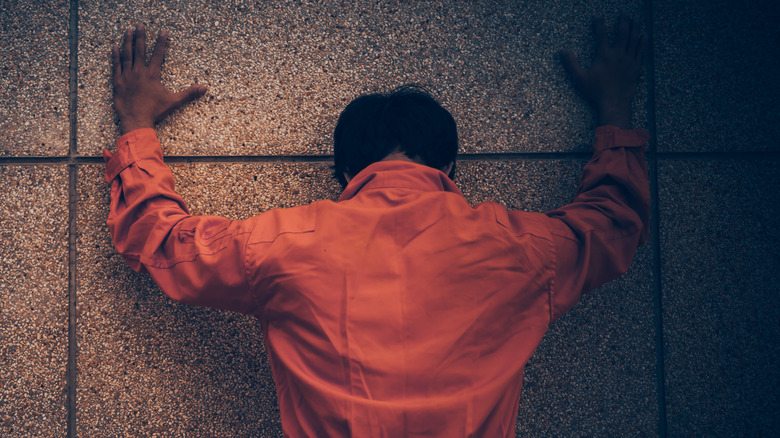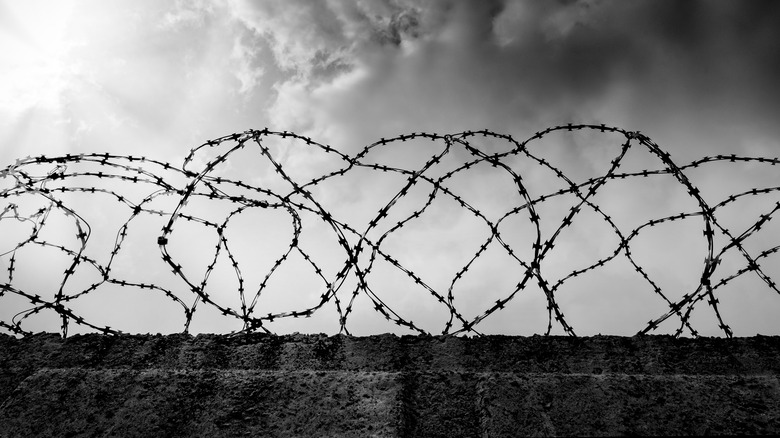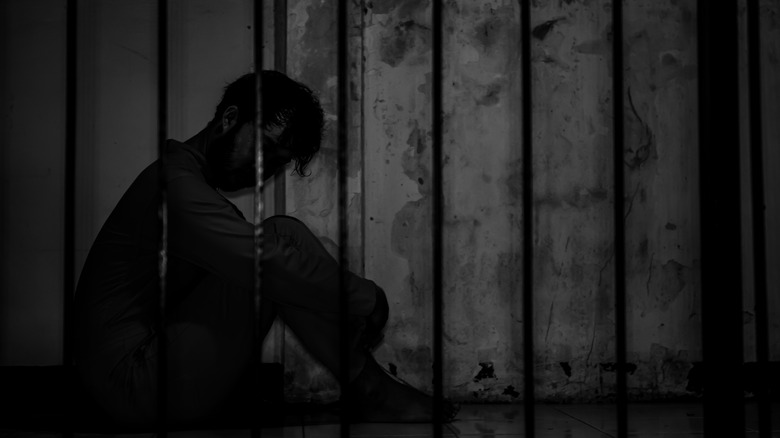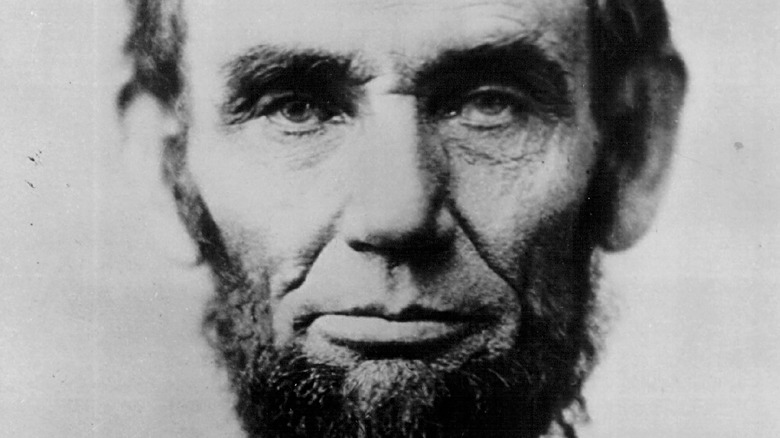This Country Recently Carried Out The Most Executions In A Single Day
In the United States, capital punishment is a point of contention. While many support it, others heartily disapprove. According to the Death Penalty Information Center, in the United States, 1,543 people have been executed since 1976. Statista writes that Texas specifically has had more executions than any other state. Despite these high numbers, the Pew Research Center reported that executions and death sentences have decreased in recent years. In fact, although different states might schedule executions for the same day, rarely do they ever occur. The same cannot be said for Saudi Arabia.
Ruled by Prince Mohammed bin Salman since 2017, The Atlantic describes the Saudi leader as enigmatic. Although he is attempting and for the most part, succeeding in modernizing the country, his cold-blooded tactics have been questioned. Bin Salman is believed to have been behind the 2018 murder of journalist Jamal Khashoggi (via CNBC). Additionally, Saudi Arabia has gained a reputation for imprisoning anyone who criticizes bin Salman's regime and for violating human rights (per Amnesty International).
The U.S. Department of State explains that Saudi Arabia adheres to Sharia law. Under this practice, capital punishment is used for various crimes, many of which are non-violent. In 2020, Saudi Arabia executed 27 people in total. In 2021, they executed 67. As of March 2022, they had a total of 92 executions so far, per the Death Penalty Information Center.
Saudi Arabia executed 81 men in one day
On March 12, 20220, Al Jazeera reported that Saudi Arabia executed 81 people in one day. This topped the kingdom's previous mass execution in recent years. In January 2016, they executed 47 people in one day. Their largest mass execution before this was in 1980, in which they executed 63 people on the same day (via CNN). The Saudi government stated that they were given an attorney and fairly tried. NBC News begs to differ. They believe the country wanted to take advantage of the world leaders' distraction with Ukraine to intimidate their people and prove that they are powerful and can operate with impunity.
Per CNBC, this news came a little over a year after bin Salman had announced that he was going to make legal reforms in order to continue his modernization process. Instead, it has brought light to his crimes against humanity and the kingdom's previous mass executions. The United Nations denounced this act and wrote that all had been beheaded. Additionally, the victims' remains were not given back to their families for burials.
Despite the kingdom's explanation that they are doing what they need to in order to protect their national security, Lynn Maalouf from Amnesty International stated, "This execution spree is all the more chilling in light of Saudi Arabia's deeply flawed justice system, which metes out death sentences following trials that are grossly and blatantly unfair, including basing verdicts on "confessions" extracted under torture or other ill-treatment."
What crimes did these men commit?
Of the 81 that were executed, CNN writes that 37 were Saudi nationals, one was Syrian, and seven were from Yemen. A statement from the interior ministry revealed that "These individuals were convicted of various crimes including murdering innocent men, women and children" (via Al Jazeera). The 37 Saudi nationals were found guilty of an assassination attempt on a security guard. Others were convicted of joining terrorist organizations or having "deviant beliefs."Amnesty International delves deeper and explains that the victims committed armed robberies or smuggled in weapons, while others were simply peaceful protestors.
The United Nations reports that 41 of those executed were Shia Muslims that had participated in political protests in 2011 and 2012. Despite all of these different alleged crimes, NBC News points out that the kingdom failed to give any evidence to back up these claims. High Commissioner for Human Rights Michelle Bachelet told the United Nations, "Our monitoring indicates that some of those executed were sentenced to death following trials that did not meet fair trial and due process guarantees." Ultimately, this 81 person mass execution could possibly be labeled as a war crime for this very reason.
Capital Punishment in Saudi Arabia
As explained by CNBC, Saudi Arabia has no codified legal system and practices Islamic law. In other words, the country does not have written legislation with all of its offenses and their consequences (via The U.S. Department of State). Under Islamic law (also known as Sharia law), one can be sentenced to death for a wide range of reasons, including adultery and more. Amnesty International writes that people can also be sentenced to death for drug-related offenses. Although bin Salman promised to reform and clarify the legal system in 2021, he has failed to do so and has increased the frequency of executions.
Sarah Leah Whitson from Human Rights Watch stated "The death penalty is never the answer to crimes, and executing prisoners en masse further stains Saudi Arabia's troubling human rights record." This is even more concerning as some prisoners are allegedly denied a lawyer and tortured into confessing a crime they perhaps never committed.
According to Reprieve — a legal action charity that works to help people sentenced to death around the globe – there are three methods Saudi Arabia uses for executions. They include beheading or crucifixion, firing squad, or stoning. Some are done within the prison, others in public spaces. A majority of the time, the prisoner and his family are not notified about the impending execution.
Saudi Arabia is sentencing children to death
According to the BBC, Abdullah al-Huwaiti was 14 years old when he was accused of committing murder and armed robbery. In 2017, he allegedly shot a police officer while stealing from a jewelry store. Amnesty International writes that despite being a juvenile, he was subsequently sentenced to death for his crimes. He did not have a lawyer and was questioned without his parents. Moreover, he was put in solitary confinement for months. Per Human Rights Watch, five other defendants received a 15-year sentence and 1,000 lashes for their alleged involvement. Although al-Huwaiti had an alibi, many believe the other defendants were tortured into a confession that implicated him.
Reuters reported that al-Huwaiti's conviction was eventually overturned in November, 2021 and a retrial was to follow. However, Sky News reported that al-Huwaiti was once again sentenced to death in March 2022. In 2018 Saudi Arabia announced that minors would receive a 10 year sentence for crimes. They did note, however, that murder did not apply to this directive. In 2020, the kingdom removed the death penalty for minors but al-Huwaiti was essentially grandfathered in since he committed the crime before then. Now 20 years old, he is on death row for a second time.
The largest mass execution in US History
Saudi Arabia is certainly not the first or perhaps even the last country to perform a mass execution. The United States, for example, had its largest mass execution on December 26, 1862, in Mankato, Minnesota, per the Death Penalty Information Center. This resulted in the deaths of 38 Native Americans from the Dakota Tribe. According to the Sanhan Journal, the orders of the execution came from Abraham Lincoln due to the Dakota War of 1862. The war began when U.S. Government took over a majority of the Dakota's land with the promise of payment. They, however, failed to pay, which caused the starvation of several Dakota peoples.
They replied by killing five white men and inadvertently starting a 37-day war. This eventually led to the surrender and trial of thousands of Dakota men. The trial was reported to be unfair and unjust as they were unfamiliar with the legal system and the English language. Ultimately, 38 men were sentenced to death and publicly hung with 4,000 spectators lining the streets of Mankato. As of 2022, the National Conference of State Legislatures writes that 27 U.S. states have the death penalty, with lethal injection being the most common manner of execution.





